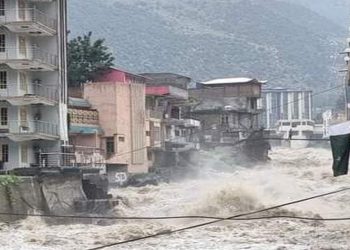Ahead of the general elections in Pakistan, the World Bank gave a candid warning for the upcoming government to make choices while making it clear that international lenders and development partners could only advise with international experiences of successes and some financing but hard choices and course correcting decisions could only be taken within the country. Although, Pakistan may soon witness a certain level of economic stability due to ongoing efforts, the medium and long term economic outlook remains largely unchanged.
The persistent absence of substantial economic reforms, notably the failure to address undertaxed sectors like retail trade and real estate, continues to present formidable challenges. Uncertainty about the upcoming general election in Pakistan has somewhat subsided after the Election Commission announced that polls would be held in the last week of January 2024 and also notified the preliminary delimitation of constituencies a major milestone before the poll. 2023 unfolded as a tumultuous period for Pakistan’s economy, marred by a series of crises and challenges that cast a long shadow over the nation’s financial well-being.
The onslaught began with the lingering aftermath of the COVID-19 pandemic, which dealt a severe blow to an already fragile economy, pushing it into a recession for the second time in Pakistan’s history. As summer descended upon the nation, its economy found itself perched precariously on a precipice of uncertainty, as deeply rooted structural vulnerabilities collided with the persistent aftershocks of the pandemic and the relentless ascent of inflation. Simultaneously, Pakistan grappled with escalating domestic polarization, exacerbating the complexity of the situation.
Although an overwhelming majority of people in Pakistan demand timely elections, a large percentage of them see elections through the prism of the economy. A recent public opinion survey conducted by Gallup Pakistan has reported that the top six out of 12 major problems identified by the survey’s respondents directly related to the economy with the topmost being inflation, identified by 89% of the respondents. Poverty (88%), unemployment (88%), corruption (82%), electricity prices (82%) and electricity shortages (78%) were the other five top problems.
Pakistan’s economic crisis is expected to deepen in the foreseeable future, warned independent experts, with any delay in the next general elections likely to exacerbate the country’s financial situation amid declining remittances and foreign exchange reserves along with rapidly depreciating national currency. Over the past five years, Pakistan’s economic landscape had withered significantly. Its GDP per capita has stagnated at around $1600, (1) unemployment has surged from roughly 4% in 2018 to nearly 8% (2) in 2023, and inflation has soared to a 50-year high. These dire circumstances have culminated in a steep decline in the country’s foreign exchange reserves, posing a formidable challenge.
The Pakistani populace has been burdened by unprecedented electricity bills at a time when unemployment is rampant, and inflation has reached unparalleled levels, pushing the nation ever closer to a tipping point that could plunge it into chaos. Moreover, the economic conditions in Pakistan have led nearly half a million individuals to explore employment prospects abroad within the initial seven months of 2023, underscoring a substantial emigration of both skilled and unskilled laborers.
The Asian Development Bank (ADB) highlighted the potential significance of the upcoming general elections in boosting confidence in the economy and contributing to its recovery in its “Asian Development Outlook”. Parallel to this development, there has been noise around stabilizing the exchange rate and bringing it down to 250. This, if executed, could lead to a major relief in terms of inflation for the general population. The ADB report highlighted that in fiscal year (FY) 2023 the floods, price shocks, and political instability led to a decline in economic growth, higher inflation, a weaker currency, and reduced reserves.
To address these difficulties, the government implemented stricter fiscal and monetary policies. Despite expansionary policies, financing sources decreased and import controls restricted production. In FY 2023, growth was minimal, and inflation reached a five-decade high. Various sectors experienced declines while exports and imports decreased. Foreign currency liquidity tightened, reserves declined, and foreign direct investment decreased.
Moving forward, the regional development bank emphasized that stability and growth recovery will rely on strict adherence to an economic adjustment program. The outlook for Pakistan’s economy in fiscal year 2024 is anticipated to be moderate growth but with significant downside risks.
The ADB also anticipates a decrease in Pakistan’s inflation trends to 25% in FY2024 from the elevated 29.2% experienced in FY2023 in the wake of base-year effects setting in, normalization of food supply, and a moderation in inflation expectations. “However, sharp increases in energy tariffs under the economic adjustment programme, and the continued weakening of the rupee will keep inflationary pressures elevated. According to the Asian Development Bank (ADB), the gross domestic product (GDP) growth of Pakistan is expected to experience a modest recovery, reaching 1.9% in the fiscal year 2024 (spanning from July 1, 2023, to June 30, 2024), marking an improvement from the meagre 0.3% growth recorded in FY2023.
Pakistan would need to enter into a long-term agreement with the International Monetary Fund (IMF) to secure sustained financing over the next three to five years and that can happen only after an elected government takes charge and the parliament is willing to undertake necessary legislation for required economic reform.
Political governments tend to indulge in shiny, highly visible and expensive projects especially closer to the election. Often the real utility of such projects is questionable but the temptation to attract votes leads to spending on such projects even after procuring expensive loans. Such temptations will need to be resisted by future elected governments irrespective of the political cost.
The coming election may lead to economic improvement if a political party wins sufficient seats to form a stable government without the need of a large coalition which slows decision-making and imposes expensive compromises. Ideally, the future ruling party should come to power after thorough homework, so that it is able to efficiently implement the painful but necessary reforms in the initial two to three years, and then ease the unpopular measures in the last one to two years of its term to be able to face the next election. People generally expect that the new elected government will have the mandate and five-year term to focus on and solve the economic problems of the country.
The government will have to take tough and somewhat unpopular decisions to put the economy back on track and only a government which has received a clear public mandate can take such decisions at least in the first few years. We are setting more and more dangerous precedents for our democratic system. Free and fair elections are on the critical path for political stability in Pakistan. And political stability in Pakistan is and should be important to the world. The caretaker government and ECP’s track record is such that it is unlikely they will conduct fair elections, but the public and media must put enough pressure on them to make it happen for the sake of a stable Pakistan.
The country lacks representative governments both at the federal and provincial level at this time. It is true that without elected governments, key decisions especially the ones relating to economy cannot be taken. Even if the caretaker government takes such decisions, it is highly unlikely that international financial institutions, foreign governments and potential investors would take such decisions seriously. The long-term economic decision-making and negotiations with such institutions would, therefore, begin in earnest after elected government is in place.



























